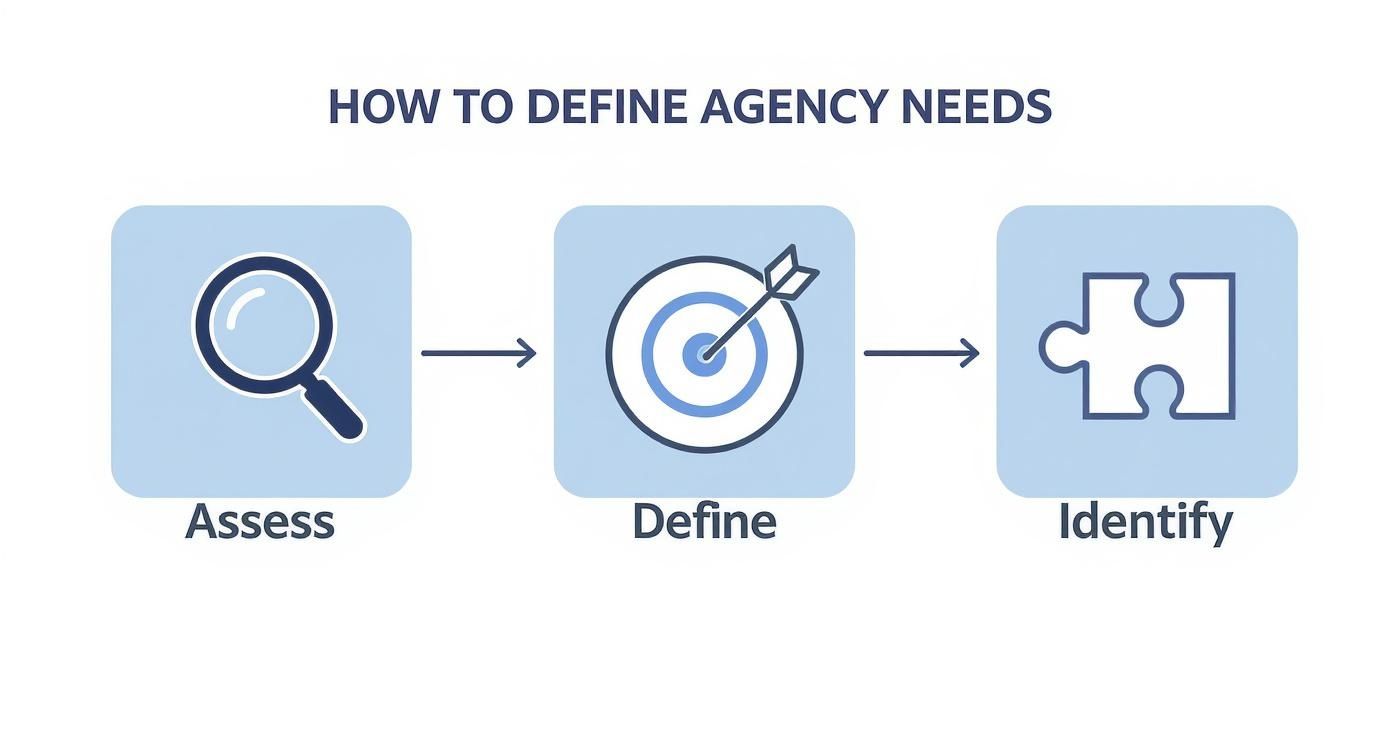Before you even think about Googling "marketing agencies for ecommerce," the most critical first step happens internally. You need to get brutally honest about what you're trying to achieve and what your team can—and can't—handle on its own.
Getting this right from the start saves you from paying for flashy services you don't need and ensures you find a partner who will actually move the needle for your business.
Defining What You Actually Need from an Agency
You have to get way more specific than just "grow our business." That's a wish, not a goal. Without a clear target, you're just throwing money at the wall and hoping something sticks.
This initial clarity is your compass for the entire agency search. It stops you from getting sold an impressive-sounding package that doesn’t solve your real problems. You could end up with a blog that gets tons of traffic but generates zero qualified leads, or a gorgeous Instagram feed that doesn’t convince anyone to click "add to cart."
Translate Vague Goals into Measurable Outcomes
The trick is to turn those broad ambitions into cold, hard numbers. This shifts your search from a vague hope into a strategic hunt for the right team with the right skills.
Let's get practical. Here’s what that looks like:
- A B2B SaaS company’s fuzzy goal of "more leads" becomes a concrete need for 500 Marketing Qualified Leads (MQLs) per quarter.
- An ecommerce brand wanting "better engagement" sharpens that into a target of a 2% conversion rate uplift from social media channels.
- A local service business aiming for "more visibility" might define success as a top-3 ranking on Google Maps for five of their main service keywords.
This level of detail is a powerful filter. An agency that crushes it with TikTok brand awareness campaigns probably isn't the right fit if your primary goal is generating highly specific B2B leads through LinkedIn.
Assess Your Internal Strengths and Weaknesses
Next, take a hard look in the mirror. What marketing tasks is your team already knocking out of the park, and where are the glaring holes? Knowing your team's true capacity and expertise is non-negotiable.
I’ve seen so many brands make the mistake of hiring an agency to do something they already do pretty well. The real magic happens when an agency fills a genuine capability gap or brings in a level of specialized expertise that you couldn't afford to hire for full-time.
Are you a content-creating machine but clueless when it comes to the technical side of SEO? You probably need a specialist SEO agency, not a massive full-service firm. Got a killer product but the thought of running paid ads gives you a headache? A dedicated PPC agency is your answer.
Making this distinction stops you from overpaying for a massive retainer when all you really need is targeted help. This kind of thinking is the bedrock of any successful partnership, and it’s a key part of effective growth planning and strategy.
This visual breaks down how that internal review process should flow.

As the infographic shows, it all starts with a solid self-assessment. That's what allows you to set clear, measurable goals, which in turn points you directly to the kind of agency partner you actually need.
So, What Kind of Marketing Agency Do You Actually Need?

The term ‘marketing agency’ is broader than it’s ever been. Knowing how to choose the right one means understanding who’s actually on the field. The industry isn’t just a handful of big names anymore; it’s a massive ecosystem of different partners, each built to solve a specific problem.
This diversity is great for your business, but only if you know what you’re looking at. Your choice isn't just between a giant, all-in-one firm and a solo freelancer. The modern agency world is packed with specialized teams that can give you a serious edge if you find the right fit.
Specialists vs. Generalists: What’s the Difference?
The biggest split you'll see is between full-service agencies and specialized boutiques. A full-service agency wants to be your one-stop shop, handling everything from SEO and content to email campaigns and paid ads. This can be perfect for brands that need to outsource their entire marketing department.
On the other hand, a specialized or "boutique" agency goes deep on just one or two things. You’ll find firms that only do TikTok marketing for fashion brands or agencies that focus exclusively on B2B content for SaaS companies. Their narrow focus means they often have an expert-level understanding that a generalist just can’t replicate in that specific area.
This trend toward specialization is exploding, and for good reason—marketing channels are getting more complex every day. The global marketing agency industry, valued at around $369.56 billion in 2024, is seeing massive growth in its digital segment. In fact, the digital marketing agency market alone is projected to nearly triple by 2034, all because businesses are hunting for this kind of focused expertise to get ahead.
How to Spot a Truly Forward-Thinking Partner
Beyond their service list, you need to tell the difference between an agency that's truly modern and one that’s just running an old, tired playbook. A forward-thinking partner doesn't just check off a list of tasks; they build a strategy and use data to get you real results.
Here’s what to look for:
- They Talk About Systems, Not Just Services: Do they talk about building a cohesive growth engine for your brand? Or do they just offer a menu of disconnected services like "SEO" or "social media posts"? A modern agency connects the dots between channels.
- They're Transparent About Their Tech Stack: What tools are they using for analytics, project management, and reporting? They should be able to clearly explain how their technology gives you better insights and makes their work more efficient.
- They Adapt to Change (and Can Prove It): Ask them how they handled a recent major Google algorithm update or a big shift in social media trends. Their answer will tell you everything you need to know about whether they're proactive and data-driven or reactive and always a step behind.
A great agency won’t just sell you a list of deliverables. They’ll sell you an outcome and show you the system they use to get there, proving how their web services and strategies build a predictable growth model.
Ultimately, navigating this landscape is about matching an agency’s structure and mindset to your specific needs. Choosing a hyper-specialized Amazon advertising agency makes perfect sense if that’s your main sales channel. But if you need to build an entire sales funnel from the ground up, a broader, system-focused agency is probably the smarter move.
How to Vet an Agency's Portfolio and Past Work
A slick presentation and a polished portfolio don't mean much without results to back them up. When you start vetting potential agencies, your job is to look past the fancy designs and impressive logos to find hard proof of their impact. This is where you separate the storytellers from the true growth partners.
Every agency is going to show you its highlight reel. Your task is to figure out if those highlights are relevant to your business and if they represent repeatable success. An agency that doubled traffic for a local coffee shop might not have the right chops to generate qualified B2B leads for a SaaS company. The skills don't always translate.
Look for Relevant Results, Not Just Big Names
It’s easy to get wowed by a portfolio filled with well-known brands. But the most important factor isn't the size of their past clients—it's how similar their challenges were to yours.
You need to find case studies that mirror your situation:
- Industry Alignment: Have they worked with other ecommerce brands in your niche? Do they get the nuances of your customer base?
- Goal Congruence: If your goal is to boost Average Order Value (AOV), do their case studies show success with metrics like ROAS and Customer Lifetime Value? Or are they just bragging about vanity metrics like impressions?
- Budgetary Parallels: Did their successful campaigns run on a budget similar to yours? Getting results with a multi-million dollar ad spend is a completely different game than driving growth on a lean budget.
Question Everything in Their Case Studies
A good case study should tell a clear story: the problem they faced, the strategy they built, and the measurable outcome. Be skeptical of case studies that are vague on the details.
A classic red flag is a case study that boasts about "increased website traffic" without connecting it to leads, sales, or revenue. Traffic is a means to an end, not the end itself. Ask them directly, "That's great, but how did that traffic translate into actual business growth for the client?"
When you're reviewing their work, it also helps to understand the common pitfalls for specific channels. For instance, when looking at their paid social results, knowing the common mistakes marketing agencies make in Facebook Ads will help you ask sharper questions about how they manage and optimize campaigns.
It’s also smart to explore a well-curated portfolio, like these examples of successful social media marketing campaigns, to get a benchmark for what excellent execution actually looks like.
To give you a structured way to approach this, here’s a quick checklist you can use to systematically evaluate an agency's past work and expertise.
Agency Vetting Checklist
| Evaluation Area | What to Look For | Red Flags |
|---|---|---|
| Case Studies | Clear data on KPIs like ROAS, CPL, LTV. | Vague results like "increased engagement." |
| Industry Fit | Experience in your specific niche or a similar one. | Portfolio consists of completely unrelated industries. |
| Budget Alignment | Examples of success with budgets similar to yours. | Only showcasing massive, enterprise-level campaigns. |
| Service Expertise | Proof of success in the specific channels you need. | Claims to be an expert in everything without proof. |
| Client Longevity | Mentions of long-term client relationships. | High client turnover or only short-term projects. |
| Transparency | Willingness to share both wins and challenges. | A "perfect" track record with no mention of obstacles. |
Using a checklist like this helps keep your evaluation objective and ensures you don’t get distracted by a flashy presentation. It’s all about finding an agency that has a proven track record of solving the exact kinds of problems your business is facing right now.
Remember, the market is always shifting. Global advertising spending is projected to hit $1.17 trillion in 2025, with a huge push towards interactive and personalized digital experiences. An agency’s past work should show they understand these trends and can create campaigns that connect with modern consumers, not just repeat old successes. This context is crucial when choosing a partner who can deliver future growth.
Aligning on Budget and Measuring True ROI

Talking about money can feel awkward, but with a potential agency, it’s a conversation you need to have early and often. A lack of budget transparency is one of the fastest ways to sour a partnership.
Your goal isn’t just to find an agency you can afford; it’s about finding one that delivers a clear return on every dollar you invest.
This means you need to move past a simple cost discussion and into a strategic conversation about value and results. A cheap agency that delivers zero growth is infinitely more expensive than a premium one that doubles your revenue.
Understanding Common Agency Pricing Models
Before you can evaluate a proposal, you need to understand how agencies structure their fees. While some use hybrid models, most will fall into one of these common buckets:
- Monthly Retainer: This is a fixed fee paid every month for a defined scope of work. It’s predictable for budgeting but requires a crystal-clear understanding of what deliverables are included to avoid scope creep.
- Project-Based Fee: You pay a flat fee for a specific, one-time project, like a website redesign or a new product launch campaign. This is great for well-defined projects but less suitable for ongoing marketing efforts.
- Performance-Based Incentives: This model directly ties agency compensation to specific results, like a percentage of ad spend, a fee per lead, or a share of revenue generated. It aligns your goals with the agency's, but the tracking and attribution have to be flawless.
The best agencies are confident enough in their work to consider performance-based elements. This shifts the dynamic from you paying for their time to you investing in shared outcomes, which is the foundation of a true growth partnership.
Recent data shows companies are becoming more focused on efficiency. In 2024, the average marketing budget dipped to 7.7% of total revenue, with a strong emphasis on ROI-driven strategies. As digital agencies raise their hourly rates—with many now charging $175–$249 per hour—it's more important than ever to ensure your investment is working hard for you.
From Cost Center to Investment Engine
The most important shift you can make is viewing your agency as an investment, not an expense. This requires a ruthless focus on Key Performance Indicators (KPIs) that connect directly to your bottom line. Forget vanity metrics like "impressions" or "likes."
To really evaluate an agency's impact and ensure a strong return, it's crucial to understand how to measure marketing effectiveness.
You need to define the right metrics from day one. For an ecommerce brand, here’s what really matters:
- Return on Ad Spend (ROAS): How much revenue do you generate for every single dollar spent on advertising?
- Customer Acquisition Cost (CAC): How much does it cost, on average, to acquire one new customer?
- Customer Lifetime Value (LTV): How much revenue does the average customer generate over their entire relationship with your brand?
- Conversion Rate: What percentage of website visitors actually complete a purchase?
A great agency won't just agree to be measured by these KPIs—they’ll help you refine them. They should have a transparent, easy-to-understand reporting process that shows exactly how their efforts are turning into revenue. These are essential components of successful, data-driven marketing strategies.
Gauging Cultural Fit for a Stronger Partnership
Expertise, a killer portfolio, and a fair budget are table stakes. Any agency worth its salt will have those covered. But the real difference between a decent partnership and a truly great one often comes down to something you can’t see on a proposal: cultural fit.
This is the human side of the equation. You’re not just hiring a service provider; you’re inviting a team into the very core of your business. If their communication style clashes with yours or their values feel off, even the most skilled marketers will struggle to deliver.
A partnership built on friction is doomed from the start.
Observe How They Communicate
Pay close attention to how the agency team interacts with you during those initial calls. Their behavior now is the best preview you’ll get of what it’s like to work with them day-to-day.
A great agency partner acts less like a salesperson and more like a curious consultant.
Look for these green flags:
- They listen more than they talk. A good sign is when they spend the first meeting asking you thoughtful questions about your business, your customers, and where you want to go.
- They ask smart, clarifying questions. Do they dig deeper? A question like, "You mentioned customer retention is a problem—what does your current post-purchase flow look like?" shows they’re genuinely trying to get to the root of the issue.
- Their team is engaged. If you’re meeting with multiple people, notice if they’re actively participating and building on each other's ideas. It shows a collaborative spirit.
The biggest red flag? An agency that launches straight into a generic pitch about their services without first understanding your specific needs. If the conversation feels like a one-sided presentation, they’re more interested in closing a deal than building a partnership.
Align on Process and Responsiveness
How an agency gets the work done is just as important as the work itself. Misaligned expectations around project management and communication are where most agency relationships go sour. You need to know how the sausage gets made.
A strong partnership is built on transparency and predictability. You should never have to wonder what your agency is working on or whether they’re making progress toward your goals.
Before you even think about signing a contract, get concrete answers. Ask them point-blank about their project management process. Do they use specific software like Asana or Monday.com that you’ll have access to? What’s their typical cadence for meetings and reports—weekly, bi-weekly?
Finally, gauge their responsiveness. While you can't expect instant replies, an agency that takes days to get back to simple questions during the vetting process will likely be even slower once you're a client.
Look for a team that communicates clearly, professionally, and in a timely manner. This final check ensures you’re choosing a partner that will feel like a true extension of your own team.
Finalizing the Partnership and Kicking Things Off

You've done the hard work—vetting agencies, checking references, and finding a team that feels like the right fit. Now comes the moment of truth: making the final call and kicking off a partnership that will hopefully drive serious growth.
How you handle this last step can set the tone for the entire relationship. It's all about moving from conversations to concrete commitments.
Don't Just Sign—Scrutinize the Statement of Work
A confident decision comes down to the details hidden in the proposal and contract. A great agency won't just slide a generic agreement across the table. They’ll provide a crystal-clear Statement of Work (SOW) that spells out exactly what they'll deliver, when they'll deliver it, and how everyone will know if it's working.
Think of the SOW as the blueprint for your partnership. It needs to be specific, measurable, and leave zero room for "I thought you meant…" conversations down the line. This document is your best friend for keeping everyone aligned from day one.
Here’s what to look for:
- Specific Deliverables: Vague promises like “improve SEO” are a major red flag. A solid SOW lists concrete actions, like “conduct a full technical SEO audit in month one” or “publish four keyword-optimized blog posts per month.”
- Defined KPIs: It should name the exact metrics that will track progress. Are we talking Return on Ad Spend (ROAS) or Customer Acquisition Cost (CAC)? Get it in writing.
- Clear Timelines: Every major task or deliverable needs a deadline. No fuzzy timelines allowed.
- Reporting Cadence: How often will you get updates? The SOW should specify if you'll get weekly, bi-weekly, or monthly reports and what information they will contain.
A well-crafted SOW protects both you and the agency. It prevents scope creep, clarifies who’s responsible for what, and gives you a clear benchmark for measuring performance. It’s the foundation of accountability.
Starting Off on the Right Foot
Once the ink is dry, the real work begins. A strong start is everything, and that means being prepared on your end for a smooth onboarding process. The first 30-60 days are absolutely critical for setting the pace and building momentum.
Your new agency is going to need access to… well, a lot of things. Getting this organized ahead of time prevents delays and shows them you’re a serious, organized partner.
To help them hit the ground running, start gathering login details for your key platforms. Before your kickoff call, be ready to dive deep into your brand’s history, challenges, and goals.
Many agencies use detailed intake forms to make this easy. To get a sense of the in-depth questions you should be ready to answer, check out this comprehensive SEO discovery questionnaire. Having these answers prepared will make your first few meetings incredibly productive and set your new partnership up for a win.
Frequently Asked Questions
Even after you've done your homework, a few questions always seem to pop up before making that final decision on an agency. Let's dig into some of the most common ones we hear from brands trying to find the right partner.
What Is a Realistic Budget for a Marketing Agency?
This is the big one, and the honest answer is: it really depends on what you're trying to achieve. There’s no magic number.
A small ecommerce startup just dipping its toes in the water might get solid traction with a local SEO campaign for $1,500-$3,000 per month. On the other hand, an established brand gunning for aggressive growth across multiple channels—think paid ads, content, and conversion optimization—could easily invest $10,000-$25,000+ a month.
The trick is to stop fixating on the price tag and start thinking about the potential return. A cheap agency that delivers zero growth is infinitely more expensive than a premium partner that generates a 3x or 4x return on your investment. Before you even look at proposals, figure out what a new customer is worth to you. From there, you can work backward to land on a realistic acquisition cost.
How Long Before I See Results?
This is where patience becomes a virtue, but you absolutely need clear expectations from the start. The timeline for seeing a real impact varies wildly depending on the channels you're using.
- Paid Advertising (PPC/Social Ads): This is the fastest way to get feedback. You can often see initial data, leads, and sales within the first 30-60 days as campaigns get up and running.
- Search Engine Optimization (SEO): SEO is a marathon, not a sprint. It can easily take 4-6 months to see meaningful movement in rankings and organic traffic. The biggest wins often don't show up until after the one-year mark.
- Content Marketing: Much like SEO, building an audience and earning authority with content takes time. Expect it to take 6 months or more to start gaining real traction.
Any agency worth its salt will give you a realistic timeline in their proposal. If someone promises you instant page-one rankings or a tidal wave of sales overnight, run. Those are massive red flags.
Should I Choose a Niche or Generalist Agency?
The right answer here is all about your specific needs. A generalist, or "full-service," agency is often a great fit if you need an entire outsourced marketing department to manage multiple channels in a cohesive way. They can build your whole strategy from the ground up.
A niche or "boutique" agency, however, brings deep, specialized expertise in one specific area. If you know your biggest growth lever is mastering Amazon PPC or blowing up on TikTok, a specialist will almost always deliver better results in that one channel. Their focused knowledge is a huge advantage when you have a very targeted problem to solve.
Ultimately, you want to match the agency’s core strength to your most critical business goal. If you've already identified a key weakness or a massive opportunity, a specialist is probably the smarter, more impactful choice.
Ready to stop guessing and start growing? At Next Point Digital, we build data-driven marketing systems that turn clicks into loyal customers for ecommerce brands. We're not just another service provider; we're your dedicated growth partner.
Discover how we can scale your brand by visiting us at Next Point Digital.